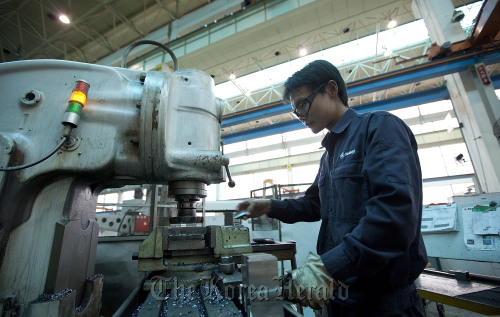China’s manufacturing unexpectedly expanded last month on increased new orders, suggesting the world’s second-biggest economy is withstanding Europe’s debt crisis and a government-induced property slowdown at home.
The purchasing managers’ index rose to 50.5 from 50.3 in December, China’s statistics bureau and logistics federation said in a statement Wednesday. That compares with a median estimate of 49.6 in a Bloomberg News survey of 17 economists. A reading above 50 indicates an expansion.
The data may back Premier Wen Jiabao’s caution in further easing policies to sustain growth even as the International Monetary Fund warns that the euro area’s crisis could trigger another global recession. Wen reiterated Tuesday the government will continue its curbs on the property market and fine-tune economic policies as needed.
 |
A Sany Heavy Industry Co. worker machines parts at the factory in Changsha, Hunan Province, China. (Bloomberg) |
The government report suggests manufacturing “has stabilized somewhat due to supportive fiscal and monetary policies,” said Liu Li-Gang, a Hong Kong-based economist at Australia & New Zealand Banking Group Ltd., who accurately predicted Wednesday’s reading. “Stronger-than-expected PMI also provides solid evidence that a hard landing for China’s economy is very unlikely.”
The Lunar New Year holiday, which ran from Jan. 22 through Jan. 28, helped boost consumer spending and domestic demand, the Beijing-based statistics bureau said in a statement on its website.
China’s benchmark Shanghai Composite Index was little changed at 10:52 a.m.
Even with Wednesday’s gain, Chinese officials will lean toward being “more accommodative” in their monetary policy to protect against risks in the property market and a “still uncertain outlook,” Liu said.
The new orders gauge of the official PMI expanded in January for the first time in three months and output rose at a faster pace, Wednesday’s data showed. Sub-indexes for export orders, imports and employment contracted further.
A separate purchasing managers’ index released by HSBC Holdings Plc and Markit Economics showed a contraction for a third month with a reading of 48.8, unchanged from the preliminary report.
The federation’s index is based on a survey of managers at more than 820 companies in 28 industries, while the HSBC indicator surveys more than 400 manufacturing companies.
The yuan fell 0.23 percent against the dollar last month, even allowing for a 0.36 percent jump Tuesday, amid speculation that the government will limit appreciation to protect exporters. Tuesday’s close was 6.3085 per dollar.
Home prices have declined in cities from Beijing to Wenzhou as the government cracks down on speculation and implements a program to build low-cost housing.
China’s economy grew 8.9 percent in the final three months of 2011, the least in 10 quarters, as exports rose at a slower pace and property curbs hurt output of products including steel and cement. Expansion may slide to about 7.5 percent this quarter and 7.6 percent in the three months through June until policies to spur growth kick in, according to Nomura Holdings Inc.
The government has so far refrained from following Asian nations including Thailand in lowering benchmark interest rates and held off in a cut in bank reserve requirements that Industrial Bank Co. and Barclays Capital Asia Ltd. had forecast for January.
Instead, the People’s Bank of China has added cash to the financial system through reverse-repurchase operations. The money-market rate in January had its biggest monthly drop since July after the central bank added the most funds in almost four years.
The IMF last week cut its 2012 growth forecast for the nation to 8.2 percent from an earlier estimate of 9 percent. Rio Tinto Group, the world’s third-largest mining company, and Anglo American Plc said last week China’s growth will remain resilient to a contraction in Europe, underpinning a long-term expansion in demand for raw materials.
(Bloomberg)







![[Today’s K-pop] Blackpink’s Jennie, Lisa invited to Coachella as solo acts](http://res.heraldm.com/phpwas/restmb_idxmake.php?idx=644&simg=/content/image/2024/11/21/20241121050099_0.jpg)
